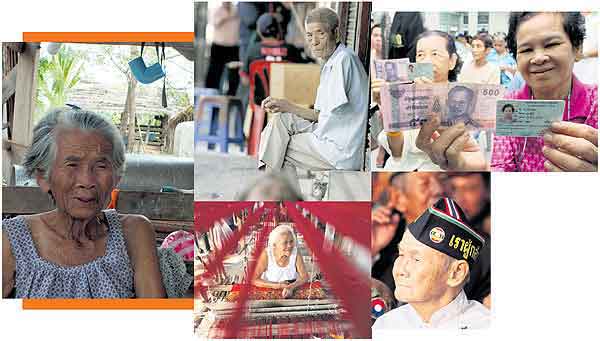|
Defusing the
Population Bomb
Bangkok Post
October 10, 2011
Thailand

As the old adage goes, "Time and
tide wait for no man." The same is true in Thailand, which is about to
find itself saddled with a population that is ageing more rapidly than
anyone had expected.
With the number of children that families are choosing to have
shrinking steadily, awareness is slowly growing of the need for a
better plan to care for the increasing numbers of elderly.
A group of local experts has been conducting an in-depth study of
population behaviour in terms of transferring wealth from one
generation to the next in order to understand how the country can
better cope with the greying society.
Working in cooperation with the National Transfer Accounts project, a
collaborative scheme aimed at measuring, analysing and interpreting the
macroeconomic aspects of age and population ageing around the world,
Thammasat University economists began a survey in 2006 on Thai
population behaviour by age group.
The researchers received a grant from the UN Population Fund through
the Nihon University Population Research Institute (NUPRI) in Tokyo.
Assoc Prof Dr Mathana Phananiramai said the survey results showed
people had less capacity to take care of family members, while no
safety net exists to help the ageing population.
"Thailand's population growth has been falling, and society is ageing
rapidly. But other countries that have experienced this have been much
wealthier than we are," she said.
The low per-capita income means the country needs a better system to
cope with the future ageing society, as people will increasingly find
they can no longer rely on family transfers. The ratio of workers to
elderly could drop to 1.6:1 in the not-too-distant future from 4:1 now.
Assoc Prof Dr Mathana said priorities should include promoting personal
savings, making the economy more competitive and enhancing economic
growth potential.
"Long-term policies seeking to promote savings and worker productivity
to make the cake bigger are more practical than short-term solutions
that incur a huge fiscal burden such as monthly pensions of 500 to
1,000 baht," she said. "The cost will only increase tremendously as
more people reach retirement age. And like it or not, people will no
longer be able to rely on family transfers."
In the vernacular of the emerging field of generational economics, many
Asian countries and territories including South Korea, Japan, Taiwan,
Hong Kong and Thailand are categorised as being in a "second dividend
period" in which the proportion of elderly has grown so large that they
can no longer be relied on to generate growth.
In this regard, Assoc Prof Dr Mathana said the government should forge
ahead with setting up a National Savings Fund, a law paving the way for
which has just been passed. Besides, the country needs to improve the
social safety net.
"We must stimulate savings before the practice of receiving handouts
and entitlements from the government becomes too ingrained," she said.
"A sustainable social safety net for the elderly is what's needed, not
big, unsustainable promises from politicians."
Assoc Prof Dr Mathana also said tighter laws for trustees should also
be drafted to protect the assets of those elderly who are unable to
handle their own affairs.
Prof Naohiro Ogawa of the NUPRI said Thai policymakers should consider
the changing social values and come up with comprehensive measures that
address the ageing demographic.
"One area that needs particular attention is education. Thailand
allocates a big investment budget for education annually. It should
ensure that the quality of the human resources it produces can cover
the investment," he said.
Prof Ogawa said Japan made a mistake in overlooking the problem of
demographic change in the decade after World War II, when new births
dropped by half over the decade.
To address this, the country in 1961 set up a social coverage system
guaranteeing huge benefits, but it proved unsustainable during hard
times.
The system also led to changes in social values that resulted in
households relying more on the government to support elderly family
members.
"While Western countries made big promises for welfare states, Japan
had to move step by step once we started universal coverage. Whenever
we had an economic crisis, we found it was not so easy," he said.
Prof Ogawa said Japan then changed to an employment-based system.
"South Korea started pension coverage in 1999 after the economic
crisis, but they put the focus very much on work and called it a
'workfare' system. Thailand might come up with its own unique model of
social insurance programme," he said.
Copyright © Global Action on Aging
Terms of Use
| Privacy Policy
| Contact Us
|



